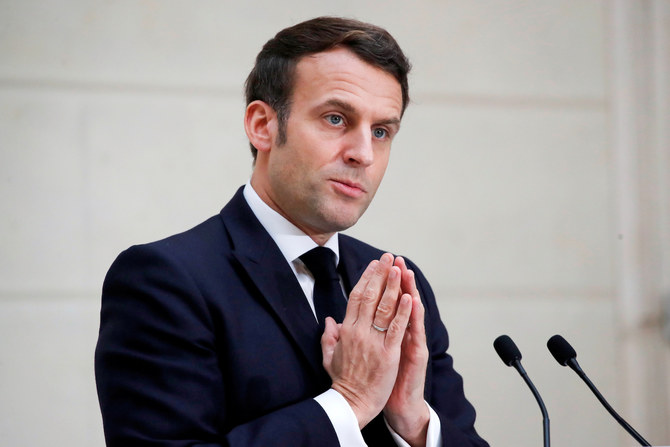'Je ne regrette rien' won't do, M. Macron

https://arab.news/5sdn5
With the brutal words “no repentance nor apologies,” Emmanuel Macron stated his position on the Algerian War and the abuses that came with colonization. Instead, the French president would take part in “symbolic acts” aimed at promoting reconciliation, his office declared.
The eight-year war of independence, in which an estimated 1 million Algerians gave their lives in order to kick out a loathsome occupation that lasted 132 years, is still a thorn in the relations between the two countries, as well as in the ties between France and its citizens of Algerian origin. Macron is already facing a problem with the Muslim/Arab community in France, many of whom are of Algerian descent. Question marks remain about how he is planning to reconcile with the 5.7 million Muslims in France, who make up more than 8 percent of the population.
When he ran for president, Macron promoted himself as a centrist candidate, offering a good compromise between the extreme right represented by Marine Le Pen and the extreme left represented by Jean-Luc Melenchon, especially after Francois Fillon, the former prime minister and candidate of the center-right, exited the scene over corruption charges. Macron was a breath of fresh air for French citizens of Maghrebin origin. As a presidential candidate in 2017, he even described French colonization as a “crime against humanity” when he was interviewed by an Algerian TV channel. However, as time passed, Macron realized that, in a polarized society, a centrist risks losing support at both ends of the political spectrum. He drifted to the right as public opinion radicalized against Islam after a series of terrorist attacks.
Following the beheading of teacher Samuel Paty in Paris last October, Macron made a speech in which he said Islam was a religion in crisis all over the world and accused French Muslims of separatism. His speech, which took on an ideological dimension, was highly offensive to Muslims and contributed to their feelings of estrangement from the French republic. A state that considers them to be separatists if they want to have any connection with their past and a government that wants to dissolve them into an alien, secular Western culture is not really a state or a government that represents them. A study by YouGov and Arab News published in November, which surveyed 958 participants from all over France, revealed that, even when they are well adapted to the country’s way of life, French citizens of Arab origin feel excluded and stigmatized.
Even when they are well adapted to the country’s way of life, French citizens of Arab origin feel excluded and stigmatized.
Dr. Dania Koleilat Khatib
However, Macron’s method of integrating them by force and by adopting a condescending attitude has the opposite effect. The president should ask himself what his endgame is. Is it to entice French Muslims to adhere to the French system or to please the extreme right? Is it to integrate French Muslims into society or to isolate them in suburban ghettos? Denying their heritage will not make them more French. Denying the crimes that were committed against their ancestors by flat-out rejecting France’s responsibility for the atrocities of the Algerian war of independence will not make them grateful toward the French republic. If Macron’s objective is to reconcile with French Muslims, then recognition should come first. Reconciliation cannot be conducted under pressure. Acknowledging past mistakes and having the ability to accept the “other,” with their own characteristics, are the first steps toward finding common ground for a better future.
Again this question comes up: Why do French Muslims identify with their country of origin more than they identify with France? It is because the French system is not flexible enough to accept people who have a different creed, different habits and different appearances. Recognition of their past and their grievances is part of integrating them. The arrogant attitude that seeks to erase their past and reject their grievances will only intensify their feelings of estrangement. Of course, as French citizens, they should feel French first and foremost. However, they only will have this sense of belonging when the French system accepts them as a complete cultural experience and recognizes cultural diversity within French society.
Macron’s insistence on “no repentance” not only affects French Muslims, but also the overall sanity of French society. This attitude will normalize chauvinism and eclipse the human rights that the republic claims to advocate by stirring feelings of nationalist supremacy. What lesson will that teach the French youth? Will it teach them about human rights? On the contrary, it will teach them blind pride or, more likely, arrogance. It will teach them that, whatever they do to other nations, it will be acceptable and that they have the right to infringe on other nations’ rights. It offers a very bad lesson in civic education.
Recognition does not bring with it guilt. Rather, it will relieve the French collective consciousness of its guilt. It is an expression of courage and strength to face one’s past, with all its flaws, to embrace it and learn from it. Denying the crimes that were committed against the Algerians will not make France a better country, nor will it make history erase this episode. Grievances and bitterness should be overcome; however, a frank discussion is needed to achieve that. Denial will not improve the relations between French Algerians and France. Macron should realize that “symbolic acts” will not do the job — recognition is needed to achieve reconciliation.
- Dr. Dania Koleilat Khatib is a specialist in US-Arab relations with a focus on lobbying. She is co-founder of the Research Center for Cooperation and Peace Building, a Lebanese NGO focused on Track II. She is also an affiliate scholar with the Issam Fares Institute for Public Policy and International Affairs at the American University of Beirut.










































